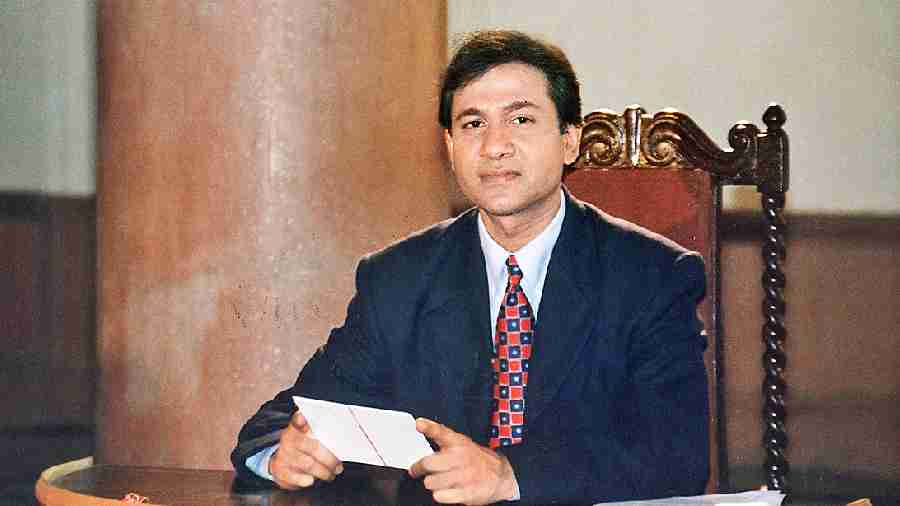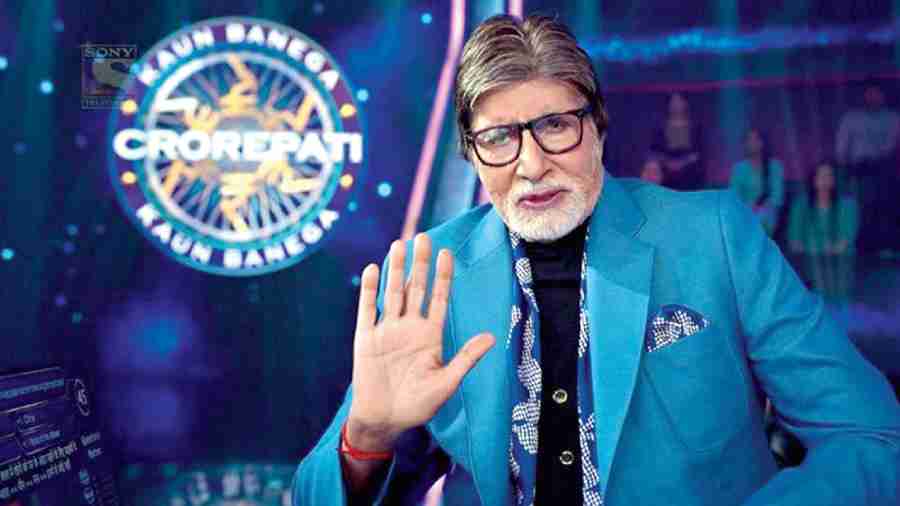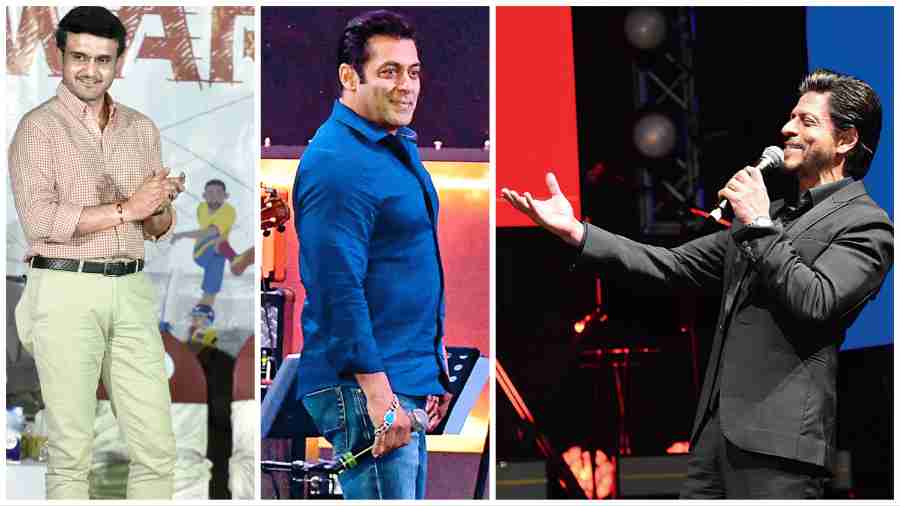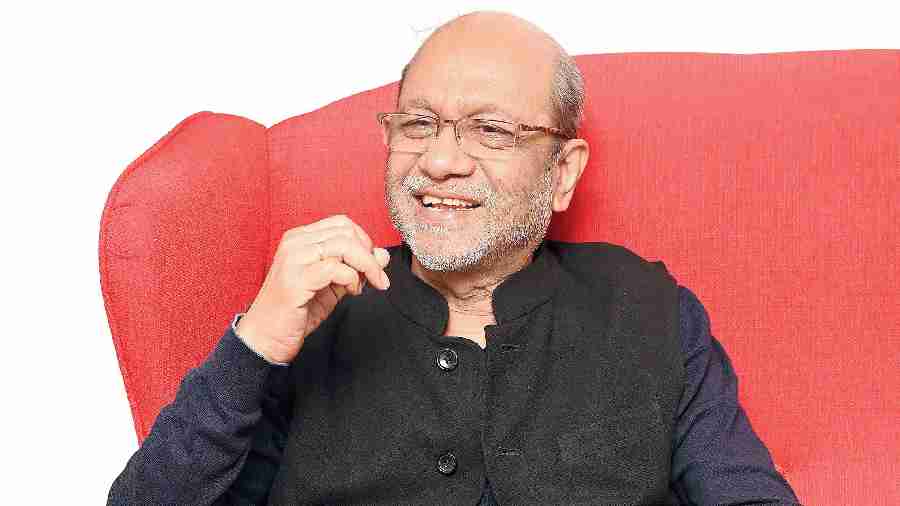Back in the days when we were growing up, he was everything we wanted to be. Educated, articulate, smart, well-read and knowledgeable. An iconic Bengali making waves on national television. Siddhartha Basu was just so empowering to watch. The quizmaster who would become synonymous with Indian television quizzing for generations, made our chests swell with pride just like Sourav Ganguly would, years later, leading his pack, from the front, scripting an unforgettable era in Indian cricket. A global Bengali. When we met the legendary Basu recently on the sidelines of British Deputy High Commission Kolkata’s Great British Open Quiz that was partnered by The Telegraph, which he hosted, we found him to be exactly everything we had assumed he would be. And, much more. Warm, endearing, candid, unassuming and strikingly humble. Excerpts from a freewheeling conversation.
You are such an icon. Tell us about your journey...
college. In fact, the first play that I professionally directed, when I just graduated, at 20, was in Calcutta in 1975. Different city, different times. When I was there, Emergency was announced. My sister and her husband, fairly newly married, were staying at an American Jute campus in Chengail, which is down the Hooghly. I used to commute to the city and do workshops for Red Curtain, at a rehearsal backroom in Elite cinema. We mounted an experimental production of Macbeth called A Macbeth by Charles Marowitz.
I was self-employed virtually from college. We formed a theatre group in Delhi which was rather avant-garde for its time, called Theatre Action Group or TAG, and the artistic director was Barry John, a very good British teacher and director who came to India and stayed on. I was only 17-18 when we started that group. The whole group was very young and we did theatre, ensemble and experimental work. I would have loved a career in theatre but it was too idealistic and there were no prospects then and there aren’t any now. Few people managed to make a living doing theatre and there was no family inheritance to indulge in that kind of passion if you weren’t able to support yourself. I, however, tried hard to do that. I would direct plays for groups, schools, colleges, universities or do workshops.
Then I started working on documentary films for Doordarshan because cinema was a separate passion. I was working with an organisation called TVNF — Television News Features, which was then the only organisation in the entire country to do two fortnightly features for Doordarshan for different kendras in different languages.... Film Institute was never a thought because I wasn’t Hindi-bhashi enough and it was never the thought because I wasn’t interested in commercial cinema in any case. We made documentaries in Delhi, black-and-white 16mm films, for almost eight years, on popular science, development news features and learnt on the job. We did everything ourselves, from shooting to even cel animation.
Then, after about eight years of doing that, I briefly joined as a so-called ‘cultural attache’ in Delhi for the Taj group, for a couple of years. There used to be mega events for the World Energy Conference, Commonwealth Heads of State Summit, and so on, where there were hundreds of artists doing different things, all happening in a multi-focal and exciting way. It was challenging and fun to pull off, but I joined that job because I needed a white-collar job to be able to marry my long-time girlfriend! (Laughs).
At the hotel, when I used to do all these events, I used to emcee by default. Towards the end of that, almost by happenstance, former documentary filmmaking friends were doing a pilot for DD. I was emceeing a New Year’s event and these colleagues and friends of mine came to document it and they saw me do my gig. Later, I got a call to introduce the show and quizmaster, and I did it. It was for a game show called Safe Cracker. A month later they called to say why don’t I host it? It was my way to get out of the hotel and get back to my field.
So, I hosted it for a year and got paid a princely amount of Rs 1,000 per episode! But it was enough. One thing led to another. The first time I hosted, I used to get gaalis in the newspapers because I was being given the questions last minute a lot of the time and there were a few errors. So, I took over the content next time around and by the third series started producing the show too. We never thought of ourselves and still don’t as businessmen or entrepreneurs, but more as professionals.

Where did you derive the confidence from?
What I think I brought to hosting was a sense of stagecraft and drama, which came from theatre and some experience of emceeing. Also, because in due course I directed, you also brought in a sense of how to format a show and package it and make it interesting for viewers.
But I was a stranger to quizzing before I became a quizmaster on national TV! In college, I was never a quizzer. My juniors like Shashi (Tharoor) and Ram (Ramachandra) Guha were the guys who set up the quizzing society in St. Stephen’s (College; Delhi) for the first time. I was reasonably well-informed, but I never took part in competitive quizzes. But I had done science documentaries for so long and because of my reading, the research orientation was always there. We took the content seriously as producers. As a host, you had to make it meaningful and come alive.
I didn’t come to quizzing as a quizzer. I came to it as a communicator and a performer. Then to be able to have control over what you were doing and do it in the way you wanted, we went independent as producers. My wife (Anita Kaul Basu), too, has had a huge role. She is one who is trained in mass media and studied at the Indian Institute of Mass Communication. Anita is pragmatic, a good manager and has an interest in the creative part of things too.
Together we built these teams which did these shows. A lot of them were quiz shows but we have done a lot of shows through the years, but are best known for the quiz shows.Now, we have stepped back from active production. We lived in Bombay for 10-15 years, but our home was always in Delhi. So we came back to Delhi. We have our content team there and are about to launch a quiz app and related contest and show. Any event or show that you have in this space has to have a 360-degree approach using different platforms.
There has to be ongoing engagement beyond just viewing. I want to do this interactive work on the app to strengthen a factual culture and to build a knowledge community.
Initially, would you personally pick out all the questions?
I worked as a curator, editor and compiler of quiz content. Still do. Research was much tougher then before the Net brought things to our fingertips. What are the questions that will make you think or make you look at something afresh? I never came to it from the point of view of trivia. Mine was always in terms of curiosity, discovery, finding out about things, unveiling lesser-known aspects about wellknown things or clarifying halfknown things.
We did one of our first quiz books with Naveen Kishore of Seagull Books. He was innovative. It was at first a sponsored quiz book about the origins and beginnings of things and we worked on it for six months and it sold in lakhs. The tag line was ‘The India Quiz Book’, but Naveen called it Inquizitive.
We worked on a set of general knowledge books for schools called Know For Sure with Encyclopaedia Britannica in 2010, after a year-anda-half’s work. It was visual, thematic and a workbook. You could interact with it and do informed guesswork. That series of books surprised us all and it still sells a million copies a year.
We did our last book with DK (Dorling Kindersley) called Indian Century: A Quizzical History of the Makers and Making of Modern India. It is not your typical quiz book but a quizzical history of 20th century India, which I believe has been a formative period for this country.
So, really, it’s been about how to unlock curiosity, share interesting things, push the frontiers of discovery learning and make it edutaining. In terms of learning, if you enjoy learning, it means something to you and it leads to knowledge and hopefully wisdom at the end (laughs).
You have seen the rise and fall of television. What do you make of TV now?
Technology is like that and the times we are living in are like that. Everything is changing radically. Nobody knew the Internet would be what it is or social media. Appointment television is disappearing because you want to be able to watch what you want when you can. Broadcast is having a tough time surviving. So, then people have to find different ways of engaging. Frankly, I didn’t see this coming and I don’t know how many people did — when SMS was just coming in, some people said now eventually everyone would do everything on the phone. This was the early 2000s. And, see what happened.
I think adapting to change and living with it has become an issue. Who knew that reading would be such an endangered thing? People don’t go to movie theatres for the experience as we did earlier. But how do you then make things which are for your home screen? How does cinema survive? Even the OTT platforms worldwide, to my knowledge, are facing a crisis, to commission big-ticket original work. The boom times are waning.
We’ve had the best of it in this country, much more inexpensive than anywhere else. We don’t know how long we’ll be able to get this as cheaply or how they’ll be able to sustain. So, we live and set goals for shorter periods. We have to try and ride the tiger and hope it doesn’t eat you up.
You’ve also reinvented yourself...
To survive and be relevant and engaging, you have to. I am excited about the quiz app. Tomorrow, maybe apps will be a thing of the past and something else will come in, but while it’s there, make good use of it. There is a mega project on Gandhi happening by Applause (Entertainment). They are producing an epic three-part series on Gandhi, and they have bought the rights to Ram Guha’s biographies (Gandhi before India and Gandhi — The Years That Changed the World), which are outstanding and definitive biographies of Gandhi in my view, deeply researched, readable and interesting. I am a consultant on that project. So, I want to be able to do different things.

Amitabh Bachchan conducting KBC
You have worked with the emperor of reinvention, Amitabh Bachchan. What do you think keeps him ticking?
I think for him, he loves to connect with the audience, performing and working. He makes his work enjoyable and that keeps him going. We have worked together for over 21 years (on Kaun Banega Crorepati) and the way he applies himself, he is still an eager learner and doesn’t take his talent for granted. He still prepares and focuses on what he is doing in a single-minded way. He puts in such long hours despite niggles of age and he wants to put his best foot forward.
Is he your best student?

(L-R) Sourav Ganguly, Salman Khan, Shahrukh Khan.
It takes a village, you know, to puttogether a show like KBC. I have worked in nine languages. Different people have different approaches. Sourav (Ganguly) was good at it in his own way even with minimal prep time. Shah Rukh (Khan) is a guy at the back of the class who doesn’t seem to be listening but is so fast on the pickup. Mr Bachchan is like the front-row student who wants to jot down everything. With Salman (Khan), what you see is what you get. He’s had longevity on television. The first season of 10 Ka Dum re-imaged him and he can be spontaneous. With Mr Bachchan, it’s also how he has sustained it andkeeps rejuvenating the persona. It’s a great fit and that’s what works.
What is the quizzing scenario in the country right now?
Off television, massive. Right from Quiz Time (on Doordarshan), we have seen on the ground, it’s crazy. We have done quizzes for neoliterates and it was so moving. For them, they feel hieroglyphics are coming alive and that they will get empowered. I have done a live quiz for Bhabha Atomic Research Centre for a jamboree of the entire nuclear science community in the country. We have done quizzes in Tihar jail for under-trials. Gajraj Rao (actor) conducted it. We have done quizzes with Members of Parliament. We used to do a quiz regularly in Jamshedpur for Tata Steel and there would be massive crowds in Patna too. I was once presented with a directory of 500 quiz clubs in Patna City! This was the early ‘90s.
I think there’s room for lots to happen and I hope it does. Like all education, make it relevant and interesting.
